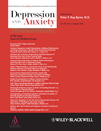GUILT, SHAME, AND SUICIDAL IDEATION IN A MILITARY OUTPATIENT CLINICAL SAMPLE
Abstract
Background
Increased suicide risk among US military personnel is a growing concern. Research has linked trauma exposure, including exposure to combat-related injuries, death, and atrocities to suicidal ideation among combat veterans. Guilt (feeling bad about what you did to another) and shame (feeling bad about who you are) have been proposed as potential contributors to suicidal ideation among military personnel, but have not yet received much empirical attention.
Methods
Sixty-nine active duty military personnel receiving outpatient mental health treatment at a military clinic completed self-report symptom measures of guilt, shame, depression, posttraumatic stress disorder, and suicidal ideation while engaged in treatment. Generalized linear regression modeling was utilized to test the association of guilt and shame with suicidal ideation.
Results
Mean levels of guilt and shame were significantly higher among military personnel with a history of suicidal ideation. Guilt (B = 0.203, SE = .046, P < .001) and shame (B = 0.111, SE = .037, P = .002) were independently associated with severity of current suicidal ideation above and beyond the effects of depression, PTSD symptoms, and the depression-by-PTSD interaction, and fully mediated the relationships of depression and PTSD symptom severity with suicidal ideation. When considered simultaneously, only guilt (B = 0.167, SE = .053, P = .001) was significantly associated with increased suicidal ideation.
Conclusions
Guilt and shame are associated with increased severity of suicidal ideation in military mental health outpatients. Guilt has a particularly strong relationship with suicidal ideation.




